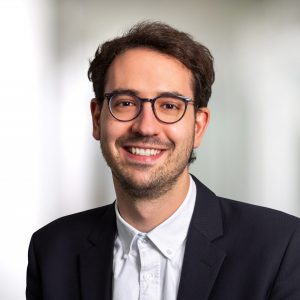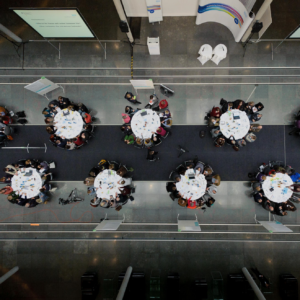How we can effectively involve people who have not been heard so far.
A third of the German population feels largely invisible and ignored in social debates, “More in Common” published in a study. This can be a danger for our democracy, because if people believe that their perspectives and realities of life do not play a role in politics, they have little motivation to participate in political debate. At worst, they lose trust in our political system, disengage mentally or sometimes even tend to radicalise. This holds true for Germany, but also other EU countries.
Over the past two years, the Fair Energy Transition for All project team has experienced first-hand, why it is particularly important to involve target groups that are difficult to reach.
How do we have to shape the energy transition in the EU – in Germany and eight other European countries – so that it is also fair for people who have little money? About 900 people from financially difficult backgrounds dealt with this question in focus groups: Long-term unemployed, senior citizens affected by poverty, young people without a school-certificate or with difficulties finding an apprenticeship, single parents, and people with migration background. Experts with different professional experiences “translated” the discussion results from these dialogues into policy recommendations. As a next step, “Fair Energy Forums” brought together affected people again to examine the experts’ proposals for recommendations from their perspective, to comment and prioritise them from their view.
“Fair Energy Forum”: What is particularly important to German citizens?
Also, in Germany a lively discussion took place: On 9 July, 16 people from Dortmund, Düsseldorf, Berlin, Langenhagen and Hanover came to the Kaiserhof in Hanover for a “Fair Energy Forum”. Right from the start, the atmosphere was exceptionally good and relaxed. Incredibly fast, valuable comments were contributed by the participants –important aspects for shaping political measures that rarely find their way into the political debate. For example:
- A 365-euro ticket for public transport hardly makes sense for people who don’t have much money: They can’t pay the amount all at once, and if they choose to take a bicycle in the summer and don’t need the ticket, they have spent money unnecessarily. Prepaid cards or 1 euro/day options were suggested instead.
- Energy and electricity costs are often much higher than average for unemployed people, chronically ill people or early retirees because they spend a lot more time at home than employees who leave their home in the morning and come back in the evening.
- People with little money cannot afford energy-saving devices or the replacement of their appliances, and there is insufficient support from many landlords.
The Fair Energy Forum showed that many realities of life that exist in abundance in the country and in the EU have hardly been perceived and taken into account in policymaking. Yet it is so valuable and important to include these perspectives and the people behind them.
For example, there is Claudia* from Hanover, who retired early due to a chronic illness and lives on the poverty line. She is committed to the interests of people like her and says: “We are not socially weak; we are financially weak.”
Peter* from Dortmund is concerned about saving energy, and he worries that too little is being done. He would like to see less spontaneous situational, but more far-sighted politics. “In the first place, it’s important to voice your concerns.”
Rudi* from Dortmund says, “With the 9-euro (transportation) ticket, I think it’s stupid that everyone has to pay only nine euros – even if you earn 3,000 euros or more per month.”


How can dialogues with financially weak target groups become a success?
From our work in the Fair Energy Transition for All project and other projects, we know how dialogue succeeds with people who otherwise participate less in political processes and are less likely to vote:
- We reach people where they are in their everyday life: at a senior citizens’ breakfast, in measures of the employment agencies, in the family centre. To reach people, we need a lot of time and good cooperation with multipliers.
- We have to communicate in a comprehensible and accessible way. Whether by e-mail, on site or in documentation: our language is easy to understand, authentically and non-formal. We not only listen, but also see the person. This creates a sense of closeness and togetherness.
- We choose methods that involve people: Instead of long lectures, we have entertaining interviews. We work with pictures. We make sure that everyone has their say. And: We regularly take short breaks – even if they have not been scheduled, as the needs of the participants are what matters most. This makes the joint work a success for everyone!
- We have to make sure that results are effective. Who should continue to work with the ideas and feedback from citizens? How do they flow into the design of political measures? As in any good citizen participation, these are key questions that need to be answered at the beginning. We also need to make sure that citizens are informed about what will happen to their results in the further process. Communication at eye level and mutual appreciation do not end with participation.
What happens next?
The results of the Fair Energy Transition for All project are now being summarised and communicated to decision-makers at the German level, this also happens in the other eight countries and at the EU level. ifok is responsible for steering the overall project at the European level and implementing it in Germany. In doing so, ifok works on behalf of the King Baudouin Foundation, the Deutsche Bundesstiftung Umwelt, the Stiftung Mercator and further European foundations.
We know from our previous communication of the results: The interest among decision-makers is huge. It sounds so simple, but in the political arena, we have hardly been talking to people with financially weak backgrounds so far.
Our hope is that this will happen much more often in the future! We are ready for it.
Written by Jennifer Rübel, Richard Steinberg and Jacob Birkenhäger
*All names changed for this article
Questions? Talk to us!

Jacob Birkenhäger
Business Unit Manager | Deliberation, Open Government, Democracy
| Phone | +49 30 536077-45 |
|---|---|
| jacob.birkenhaeger@ifok.de |
Learn more

Article
How citizens’ assemblies can effectively complement political work
Citizens’ assemblies are becoming increasingly important in Germany and Europe. How can randomly selected citi…
Continue reading „How citizens’ assemblies can effectively complement political work“
